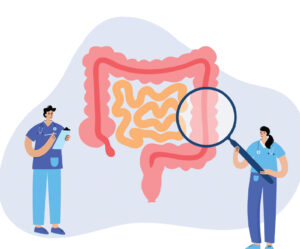Colon Cancer
Colon Cancer

Colorectal cancer is considered as third most common cancer worldwide .Colon cancer/ colorectal cancer, is also referred to as Bowel Cancer which develops in the large intestine (colon). The colon is the last part of the digestive tract. The cancer starts in the rectum or colon lining, where healthy cells transform and grow uncontrollably to produce a mass or lump known as a tumor.
Typically, adults are more affected by colon cancer, but it can happen at any age. Small, benign (non-cancerous) cell clusters called polyps commonly grow on the inside of the colon as the first signs of the condition. Some of the polyps may eventually develop into colon cancer. The doctors advise routine screening exams to help prevent colon cancer.
Signs and Symptoms:
 Early stages of colon cancer are often asymptomatic. The signs and symptoms that may appear in the later stages are:
Early stages of colon cancer are often asymptomatic. The signs and symptoms that may appear in the later stages are:
- Change in bowel habits
- Abdominal discomfort
- Fatigue
- Weight loss
- Bloody Stool
Visit Bengaluru’s leading Medical Oncologist and Colon Cancer specialist Dr.Manish Kumar if any of the above symptoms continue over a proplonged period of time.
Diagnosis:
To look for the signs of colon cancer or non-cancerous colon polyps in healthy people who show no signs or symptoms, screening tests are recommended by the doctors. This helps in early identification and provides a greater chance for the cure.
Screening for people with average risk of colon cancer can be done around the age of 45, as suggested by doctors.
Your doctor may recommend several tests and procedures, if your signs and symptoms designate the presence of colon cancer, like:

Colonoscopy: Colonoscopy is a procedure that helps to observe closely the interior of the intestine by inserting a lighted tube via anus.Radiological Tests: To help identify the exact location and size of the tumor, various radiological tests such as CT scan, PET and MRI are performed.Blood Analysis: The blood sample is analyzed for the presence of carcinoembryonic antigen (CEA) which is tumor marker and can be useful in selected situations.Biopsy: A sample of the affected tissue is extracted and then tests are performed to confirm the diagnosis.

Treatment:
The detection of colon cancer at the right time can increase the survival rates as it is one of the treatable cancers. The treatment of colorectal/colon cancer depends on the advancement of the disease (stages 0-IV) and types of cancer.
The staging of disease has been done according to tumor size, lymph node involvement and whether it has spread to other body parts (metastasize). The detailed study of the disease helps to decide and plan the appropriate treatment for the patient. Treatment options for colorectal/colon cancer are surgery, chemotherapy, radiotherapy and sometimes combination of both (radiotherapy and chemotherapy). Targeted biological therapy is used in later stages (IV).
The prognosis and quality of life can be improved by altering certain life style habits. Weight management, physical activity (at least 150 minutes per week), diet (fruits and vegetables rich in antioxidants), avoiding alcohol, smoking and tobacco can be included in the life style modification. Avoid red and processed meat as it has been shown to increase the risk of colon/colorectal cancer
Visit Colon Cancer specialist Dr.Manish Kumar for prognosis,diagnosis and treatment plan.
